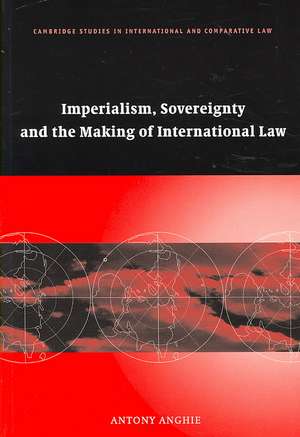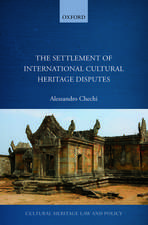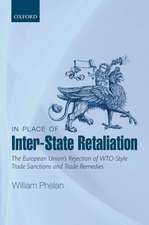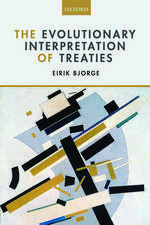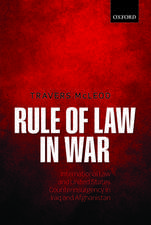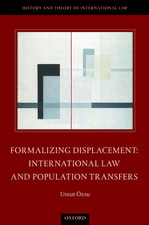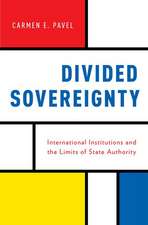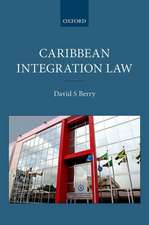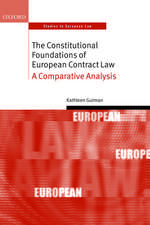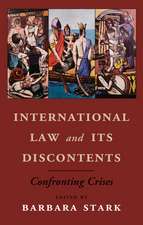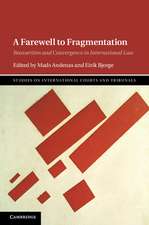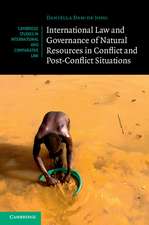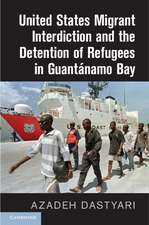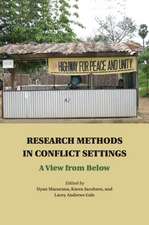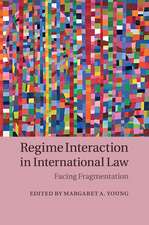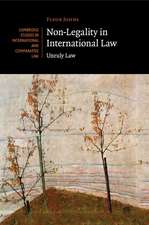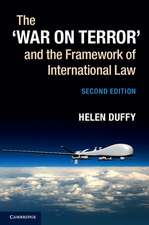Imperialism, Sovereignty and the Making of International Law: Cambridge Studies in International and Comparative Law, cartea 37
Autor Antony Anghieen Limba Engleză Paperback – 25 apr 2007
| Toate formatele și edițiile | Preț | Express |
|---|---|---|
| Paperback (1) | 231.54 lei 6-8 săpt. | |
| Cambridge University Press – 25 apr 2007 | 231.54 lei 6-8 săpt. | |
| Hardback (1) | 863.96 lei 6-8 săpt. | |
| Cambridge University Press – 2 ian 2005 | 863.96 lei 6-8 săpt. |
Din seria Cambridge Studies in International and Comparative Law
-
 Preț: 201.40 lei
Preț: 201.40 lei - 9%
 Preț: 731.44 lei
Preț: 731.44 lei -
 Preț: 231.74 lei
Preț: 231.74 lei -
 Preț: 200.34 lei
Preț: 200.34 lei -
 Preț: 231.88 lei
Preț: 231.88 lei -
 Preț: 176.91 lei
Preț: 176.91 lei - 9%
 Preț: 661.95 lei
Preț: 661.95 lei -
 Preț: 233.37 lei
Preț: 233.37 lei -
 Preț: 230.94 lei
Preț: 230.94 lei - 9%
 Preț: 765.91 lei
Preț: 765.91 lei -
 Preț: 237.53 lei
Preț: 237.53 lei - 9%
 Preț: 773.85 lei
Preț: 773.85 lei -
 Preț: 329.28 lei
Preț: 329.28 lei - 14%
 Preț: 793.62 lei
Preț: 793.62 lei -
 Preț: 238.11 lei
Preț: 238.11 lei - 9%
 Preț: 596.72 lei
Preț: 596.72 lei - 9%
 Preț: 593.37 lei
Preț: 593.37 lei -
 Preț: 209.41 lei
Preț: 209.41 lei - 9%
 Preț: 917.66 lei
Preț: 917.66 lei -
 Preț: 239.72 lei
Preț: 239.72 lei - 11%
 Preț: 639.92 lei
Preț: 639.92 lei -
 Preț: 350.03 lei
Preț: 350.03 lei - 14%
 Preț: 784.65 lei
Preț: 784.65 lei -
 Preț: 310.86 lei
Preț: 310.86 lei -
 Preț: 358.28 lei
Preț: 358.28 lei - 14%
 Preț: 698.80 lei
Preț: 698.80 lei - 14%
 Preț: 700.76 lei
Preț: 700.76 lei -
 Preț: 284.78 lei
Preț: 284.78 lei - 14%
 Preț: 896.01 lei
Preț: 896.01 lei -
 Preț: 288.04 lei
Preț: 288.04 lei - 11%
 Preț: 642.00 lei
Preț: 642.00 lei - 14%
 Preț: 731.56 lei
Preț: 731.56 lei - 14%
 Preț: 721.96 lei
Preț: 721.96 lei - 9%
 Preț: 661.91 lei
Preț: 661.91 lei - 14%
 Preț: 757.69 lei
Preț: 757.69 lei - 9%
 Preț: 662.74 lei
Preț: 662.74 lei - 14%
 Preț: 760.17 lei
Preț: 760.17 lei - 14%
 Preț: 703.42 lei
Preț: 703.42 lei -
 Preț: 363.28 lei
Preț: 363.28 lei -
 Preț: 464.33 lei
Preț: 464.33 lei -
 Preț: 324.79 lei
Preț: 324.79 lei - 14%
 Preț: 785.32 lei
Preț: 785.32 lei
Preț: 231.54 lei
Nou
Puncte Express: 347
Preț estimativ în valută:
44.31€ • 46.09$ • 36.58£
44.31€ • 46.09$ • 36.58£
Carte tipărită la comandă
Livrare economică 14-28 aprilie
Preluare comenzi: 021 569.72.76
Specificații
ISBN-13: 9780521702720
ISBN-10: 0521702720
Pagini: 380
Ilustrații: black & white illustrations
Dimensiuni: 150 x 226 x 25 mm
Greutate: 0.52 kg
Editura: Cambridge University Press
Colecția Cambridge University Press
Seria Cambridge Studies in International and Comparative Law
Locul publicării:Cambridge, United Kingdom
ISBN-10: 0521702720
Pagini: 380
Ilustrații: black & white illustrations
Dimensiuni: 150 x 226 x 25 mm
Greutate: 0.52 kg
Editura: Cambridge University Press
Colecția Cambridge University Press
Seria Cambridge Studies in International and Comparative Law
Locul publicării:Cambridge, United Kingdom
Cuprins
Acknowledgements; Table of cases; Table of treaties; Introduction; 1. Francisco de Vitoria and the colonial origins of international law; (i) Introduction; (ii) Vitoria and the problem of universal law; (iii) War, sovereignty and the transformation of the Indian; (iv) Conclusion; 2. Finding the peripheries: colonialism in nineteenth-century international law; (i) Introduction; (ii) Elements of positivist jurisprudence; (iii) Defining and excluding the uncivilized; (iv) Native personality and managing the colonial encounter; (v) Reconceptualizing sovereignty; 3. Colonialism and the birth of international institutions: the mandate of the League of Nations; (i) Introduction; (ii) Creation of the mandate system; (iii) The league of nations and the new international law; (iv) The mandate system and colonial problems; (v) The mandate system and the construction of the non-European state; (vi) Government, sovereignty, and economy; (vii) The mandate and the discussion of sovereignty; (viii) The legacies of the mandate system: toward the present; (ix) Conclusion; 4. Sovereignty and the post-colonial state; (i) Introduction; (ii) Decolonization and the universality of international law; (iii) Development, nationalism and the post-colonial state; (iv) Development and the reform of international law; (v) Permanent sovereignty over natural resource and the new international economic order; (vi) The 1962 resolution on PSNR; (vii) The 1974 charter of rights and duties among states; (viii) Colonialism and the emergence of transnational law; (ix) Sources of law and international contracts; (x) Overview and conclusions; 5. Governance and globalization, civilization and commerce; (i) Introduction; (ii) Good governance and the third world; (iii) Governance, human rights and the universal; (iv) International financial institutions, human rights and good governance; (v) International financial institutions and the mandate system; (vi) Conclusions and overview; 6. On making war on the terrorists: imperialism as self-defense; (i) Introduction; (ii) The war against terrorism (WAT); (iii) The United States and imperial democracy; (iv) Historical origins: war, conquest and self-defense; (v) Terrorism and the United Nations: a Victorian moment; (vi) Terrorism, self-defense and third world sovereignty; Conclusion.
Recenzii
'…a particularly important [book] for international lawyers, scholars and activists to read.' American Journal of International Law
'Anghie's narrative venture at reading the devastating histories of the making of the 'modern' and 'contemporary' international law, relations, and organization remains especially compelling. He brings home the roles of imperialism in full play, and war, in the contemporary remake of international law.' Leiden Journal of International Law
'Anghie makes an important contribution to the field of international law.' Law and Politics Book Review
'… much of this book will be of great interest beyond the discipline of international law - particularly to scholars of international relations, and post-colonial and development studies … an excellent and most welcome contribution' European Journal of International Law
'…argued meticulously and compellingly and should be required reading for all scholars of international law.' Modern Law Review
`Imperialism, Sovereignty and International Law is a work of expert scholarship that is simultaneously accessible and engaging. It inspires a questioning of our assumptions about international law about the motivations for our own work. It should be read by anyone interested in the future of international law.' Sydney Law Review
`…Anghie's book is a thoroughgoing account that gives voice to sentiments that seldom see the light of day, let alone are adjudged worthy of dissemination by a prestigious press. The rereading of international law is a useful corrective to conventional perspectives that normalize subjugation and its rationalization by any means necessary' Law and Society Review
`Anghie's book lays out an excellent argument for the colonial background of international law and its institutions, and it does so with numerous fresh insights and clear command of a wide range of materials' Law and History Review.
'Anghie's narrative venture at reading the devastating histories of the making of the 'modern' and 'contemporary' international law, relations, and organization remains especially compelling. He brings home the roles of imperialism in full play, and war, in the contemporary remake of international law.' Leiden Journal of International Law
'Anghie makes an important contribution to the field of international law.' Law and Politics Book Review
'… much of this book will be of great interest beyond the discipline of international law - particularly to scholars of international relations, and post-colonial and development studies … an excellent and most welcome contribution' European Journal of International Law
'…argued meticulously and compellingly and should be required reading for all scholars of international law.' Modern Law Review
`Imperialism, Sovereignty and International Law is a work of expert scholarship that is simultaneously accessible and engaging. It inspires a questioning of our assumptions about international law about the motivations for our own work. It should be read by anyone interested in the future of international law.' Sydney Law Review
`…Anghie's book is a thoroughgoing account that gives voice to sentiments that seldom see the light of day, let alone are adjudged worthy of dissemination by a prestigious press. The rereading of international law is a useful corrective to conventional perspectives that normalize subjugation and its rationalization by any means necessary' Law and Society Review
`Anghie's book lays out an excellent argument for the colonial background of international law and its institutions, and it does so with numerous fresh insights and clear command of a wide range of materials' Law and History Review.
Notă biografică
Descriere
Examines the relationship between imperialism and international law.
